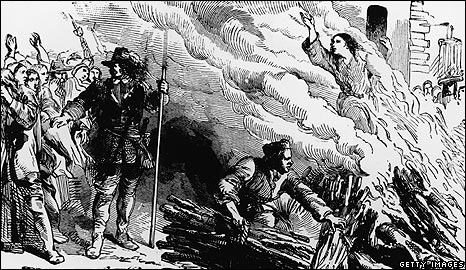Burning Lesbians September 6, 2013
Author: Beach Combing | in : Medieval, Modern , trackback
Christianity has never been particularly friendly to homosexuality, but from the thirteenth century things started to heat up immensely. There were some footling differences between sodomy and other ‘sex crimes’, but if a man was accused of having sex with a man in any form then there was an excellent chance that both would die. Some more liberal states castrated for the first offence, that begs a series of questions… The ultra liberal (by late medieval standards) Italian city states, where homosexuality seems to have been almost visible, would punitively tax and imprison offenders. But consider this: the treatment of lesbians was different. First, though any medieval cleric would be horrified to know that two women had sex, there just does not seem to have been that much interest in lesbianism. Beach has been looking through various accounts of medieval sex crimes and has come across the following cases of women being executed for homosexual acts:
1477 a girl was drowned in Speier Germany,
1533 a case of lesbianism was discussed by the parliament at Toulouse and two women were tortured before being let off for insufficient evidence.
1580 a girl was hanged in Italy for pretending to be a man and getting married (transsexual perhaps?)
In Spain two nuns were burned for a lesbian affair in the seventeenth or eighteenth century.
Now if there are four cases, then there were presumably at least ten times as many and this little list is based on a classic article written thirty years ago: a new synthesis would certainly bring out other tragedies of this type. However, the fact remains that this many male homosexuals would have been put to death in a single month in many European countries. There is no questions that it could be dangerous to be a lesbian but you would be very unlucky to end up at the stake. The question then is why there was this difference? Beach has come across various explanations and he shakes them out here for what they are worth. (i) there was often a desire to suppress the fact of lesbianism for fear, if banded about, others would be led into sin; (ii) there was ignorance about the existence of lesbianism among jurists and even priests; (iii) lesbianism was seen as being less ‘total’ as a sexual act, particularly the lack of penetration. On this last point it is interesting that women ‘becoming men’ was viewed as being particularly serious and may account for the severity of the sentence in the 1580 case above. In the few descriptions we have, inquisitors and court officials were also keen to know whether ‘instruments’ had been used in sex. Again the fear that women were becoming men… Any other thoughts why lesbianism should be so much less serious than male homosexuality? drbeachcombing AT yahoo DOT com
7 Sept 2013: KMH an old and dear friend of this blog writes: ‘Hi Beach, The simplest answer to your question is that back in the days when the church could impose sentences on those guilty of crimes, the basis was often the old testament since the new didn’t go into specific penalties . Although the penalty for homosexuality is mentioned in Lev. 20:13, for example: “If a man also lie with mankind , as he lieth with a woman, both of them have committed an abomination: they shall be surely be put to death: their blood shall be upon them,” the old testament doesn’t mention lesbianism (along with other things like cannibalism) so recognizing it as a sin or crime turns out to be more difficult, hence the fewer number of cases recorded.’ Beach would add that there is also NT verses in Paul that are clearly against male sexual activity but not women. However, isn’t there a reference to women and ‘unnatural acts’ in the Bible? If not we are looking at exactly the same phenomemon. Thanks KMH
10 Sept 2013: NA with further thoughts: In regards to your question, my personal theory is that lesbian sexual acts weren’t taken seriously by men in authority because these acts lacked penetration. To a – pardon me – sexually unsophisticated man, sex without a penis isn’t sex. Indeed, 18th century lesbians were once called “flats” after a deck of cards, the (erroneous) assumption being that during sex, one lay on top of the other and they rubbed each other to completion. As for the Church, lesbianism would certainly fall under the category of a sin since it’s sexual acts for purposes of pleasure other than procreation. But again, not taken very seriously (see above) unless the girls had the misfortune to be caught in flagrante delicto by someone who had a burning desire to make an example for reasons which may have had nothing to do with the sin itself. Male homosexuality is, for some reason unknown to me, taken as a threat by many heterosexual males. Perhaps this attitude has to do with penetration as well. If a man is penetrated sexually, then he becomes (in his own mind) like a woman, and therefore loses his masculine power and authority. Illogical, but human behavior often is.’ Thanks NA!



